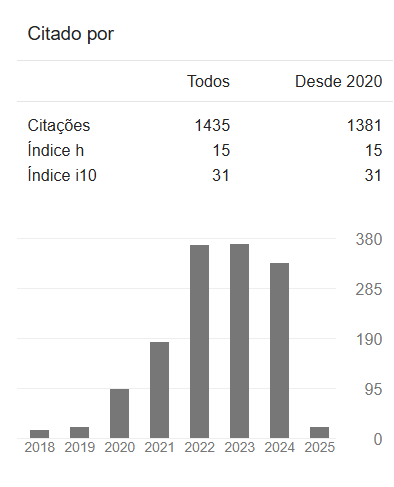THE INTERNET AND ITS ACCESS BY STUDENTS IN SCHOOL: LOOKING FOR A BEHAVIORAL AND PSYCHOLOGICAL EPISTEMOLOGY IN A SCHOOL ENVIRONMENT
DOI:
10.23926/RPD.2526-2149.2020.v5.n2.p1459-1476.id697Keywords:
New technologies, Education, Internet in education, Teacher trainingAbstract
New technologies such as the use of the internet and the cell phone are increasingly reaching the classroom. The objective of this article is to understand how the construction of a psychological and behavioral epistemology occurs in a school environment. The methodology used is based on the technique of participant observation and documentary research in the firewall of the internet network used in a school, investigating the school day in its 24 hours, in the three, of the five days of weekly classes. The results indicate that the class schedules are precisely those in which students access the network the most, even if there is a prohibition to the contrary. It is perceived that it is an educational task to mediate the formation of mental habits in relation to the time for access to technologies without removing their free will that is being exercised, by circumventing the imposed prohibition.
Downloads
Metrics
References
AUSUBEL, David. Aquisição e retenção de conhecimentos: uma perspectiva cognitiva. 2ª ed. Lisboa: Plátano Edições Técnicas, 2000.
BARBOSA, Márcia Silvana. Silveira. O papel da escola: obstáculos e desafios para uma educação transformadora. 2004. 234 f. Dissertação (Mestrado em Educação) –Universidade do Rio Grande do Sul Porto Alegre, 2004. Disponível em: < https://lume.ufrgs.br/bitstream/handle/10183/6668/000488093.pdf>. Acesso em 28/04/2020.
CASTELLS, Manuel. A Sociedade em rede. 1ª ed. São Paulo: Paz e Terra, 2017.
CHIOSSI, R. R.; COSTA C. S. Novas formas de aprender e ensinar: a integração das tecnologias de informação e comunicação (TIC) na formação de professores da educação básica. Linguagem e Tecnologia, Belo Horizonte, v. 11, n. 2 2018, 160-176. DOI: https://doi.org/10.17851/1983-3652.11.2.160-176
CRUZ, Tadeu. Sistemas de informações gerenciais: tecnologias da informação e a empresa do século XXI. 3ª ed. São Paulo: Atlas, 2011.
DAMÁSIO, Antônio.; MOTTA, Laura Teixeira. O mistério da consciência: do corpo e das emoções ao conhecimento em si. 1ª ed. São Paulo: Companhia das Letras, 2015.
DARWIN, Charles. The origen of species by means of natural selection. 1ª ed. London: John Murray, Albemable Street, 1859.
GERHARDT, Tatiana Engel.; SILVEIRA, Denise Tolfo. Métodos de Pesquisa. 1ª ed. Porto Alegre: Editora da UFRGS, 2009.
JEANNEROD, Marc. O Cérebro íntimo. 1ª ed. Lisboa: Instituto Piaget, 2005.
JUNIOR, Claudemir Públio. O docente e o uso das tecnologias no processo de ensinar e aprender. Revista Ibero – Americana em Educação, Araraquara, v.13, n. 3, 2018, 1092-1105. DOI: https://doi.org/10.21723/riaee.v13.n3.2018.11190
LÉVY, Pierre. Cibercultura. 3ª ed. São Paulo: Editora 34, 2010
LÉVY, Pierre. Inteligência coletiva: por uma antropologia do ciberespaço. 1ª ed. São Paulo: Loyola, 2000.
MORGADO, I. Cómo el cerebro aprende, recuerda y olvida. Alambique didatica de las ciencias experimentales, Espanha, v. 2, n. 68, 2011, 19-29.
OLIVEIRA, Celina Couto de. Ambientes informatizados de aprendizagem: produção e avaliação de software educativo. 1ª ed. Campinas: Papirus, 2001.
PEIXOTO, Marco Aurélio Nicolato.; TERÁN, Augusto Fachín; BARBOSA, Ierecê. Aprendizagem em espaços não formais: didática, aprendizagem e epistemologia. In: Temas sobre ensino de ciências em espaços não formais: avanços e perspectivas. Manaus: UEA, 2016. p. 151-163.
SANTROSA, Lúcia Maria Costi.; CONFORTO, Débora. Formação de professores em tecnologias digitais acessíveis. 1ª ed. Porto Alegre: Evangraf, 2012.
TENÓRIO, Robinson Moreira. Cérebros e computadores: a complementaridade analógico-digital na informática e na educação. 1ª ed. São Paulo: Escrituras, 1998.
VALENTE, Carlos.; MATTAR NETO, João Augusto . Second Life e Web 2.0 na educação: o potencial revolucionário das novas tecnologias. 1ª ed. São Paulo: Novatec, 2007.
VYGOTSKY, Lev. A Formação Social da Mente: o desenvolvimento dos processos psicológicos superiores. 1ª ed. São Paulo: Martins Fontes, 1991.
Downloads
Published
How to Cite
Issue
Section
License
Copyright (c) 2023 A Revista Prática Docente tem o direito de primeira publicação

This work is licensed under a Creative Commons Attribution-NonCommercial 4.0 International License.
Authors who publish in this journal agree to the following terms:
- Authors retain the copyright and grant the journal the right of first publication, with the paper simultaneously licensed under the Licença Creative Commons Attribution allows the sharing of the work with acknowledgment of authorship and initial publication in this journal.
- Authors are authorized to take additional contracts separately, for non-exclusive distribution of the version of the work published in this journal (e.g. publish in institutional repository or as a book chapter), with acknowledgment of authorship and initial publication in this journal.











